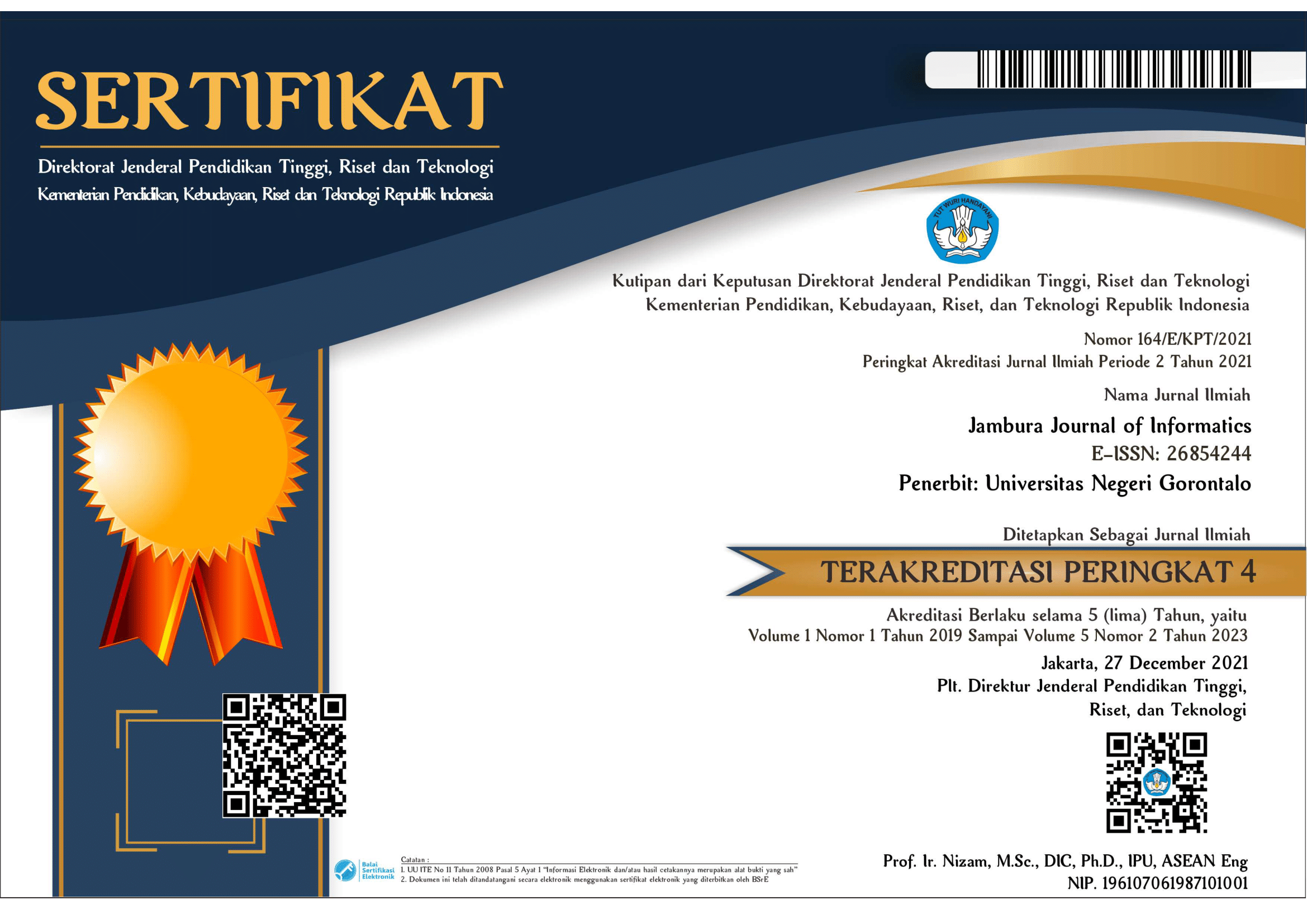Pengukuran Kesiapan Penerapan Knowledge Management di Institusi Pendidikan Tinggi
Abstract
The implementation of Knowledge Management (KM) in an organization is a strategy for achieving the vision and mission of the organization. However, such implementation does not always work successfully because of, for instance, a lack of organizational readiness pertaining to the human, the process, and the technological aspects. This study, therefore, aims to measure the level of readiness for the implementation of KM at Universitas Ichsan (Unisan) Gorontalo. To achieve the research objectives, a survey method with a quantitative approach was used. The readiness model used refers to the KM Readiness model, which relies on the Knowledge Management Critical Success Factors (KMCSF) indicator as a KM enabler factor and the Rao scale to interpret the level of readiness for KM implementation in the organization. The results showed that Unisan's KM readiness level was at level 4, which means the organization received a Receptive attribute. This shows that Unisan is well-prepared for implementing the KM in order to achieve the organization's vision and mission.
Keywords
Full Text:
PDF (Bahasa Indonesia)References
Becerra-Fernandez, I., & Rajiv, S. (2015). Knowledge management systems and processes, 2nd ed. New York: M.E Sharpe Inc.
Budiastuti, D. (2013). Kondisi manajemen pengetahuan perguruan tinggi swasta di DKI Jakarta. Binus Business Review, 4(1), 300-305.
Budihardjo, A. (2017). Knowledge management. Efektif berinovasi meraih sukses. Jakarta: Prasetiya Mulya Publishing.
Dalkir, K. (2013). Knowledge management in theory and practice. Oxford: Routledge.
Hasanali, F. (2002). Critical success factors of knowledge management, APQC.
Hlupic V., Pouloudi A., dan Rzevski, G. (2002). Towards an integrated approach to knowledge management: Hard, soft, and abstract issues. Knowledge and Process Management, 9(2), 90-102. https://doi.org/10.1002/kpm.134.
Holt, D. T. (2000). The measurement of readiness for instrument and suggestions for future research, Academy of Management, Toronto, Canada
Kati`c, A. V., Ćosic, I. P., Kupusinac, A. D., Vasiljevic, M. M. dan Stojic, I. B. (2016). Knowledge-based competitiveness indices and its connection with energy indices. Thermal Science, 20(2), 451-461. DOI:10.2298/TSCI151005029K.
Mamaghani, D., Samizadeh, R., Saghafi, F. (2011). Evaluating the readiness of Iranian research centers in knowledge management. American Journal of Economics and Business Administration, 3(1), 203-212.
Mamuaya, S., Harisno, Mihuandayani, dan Arundaa, R. 2020. Perencanaan knowledge management system untuk tata kelola perguruan tinggi. Jurnal Teknologi Informasi dan Terapan (J-TIT), 7(1), 6-15.
Masduki. (2019). Peningkatan kinerja perguruan tinggi swasta melalui penerapan knowledge management dan penguatan budaya organisasi. Coopetition: Jurnal Ilmiah Manajemen, 10(2), 129-139.
Ningsih, E. R. (2013). Knowledge management system (KMS) dalam meningkatkan inovasi LPPM perguruan tinggi. Evolusi, 1(1). 76-85.
Noja, G. G., Buglea, A., Lala-Popa, I., dan Jurcut, C. N. (2020). The interplay between knowledge"‘based competitiveness, people's good health and well"‘being: new empirical evidence from Central and Eastern European countries. Quality & Quantity, (2021)55, 441-466. https://doi.org/10.1007/s11135-020-01015-4
Perdana, A. A. (2014). Analisis pengukuran tingkat kesiapan implementasi knowledge management di Pusat Sistem Informasi dan Teknologi Keuangan Kementrian Keuangan. Tesis. Jakarta: Universitas Indonesia.
Rao, M. (2005). Knowledge management tools and techniques: Practitioners and experts evaluate KM solutions. Burlington: Elsevier Inc.
Rastogi, P. N. (2000). Knowledge management and intellectual capital. The new virtuous reality of competitiveness. Human Systems Management, 19(1), 39-48.
Sekaran, U. 2006. Research methods for business. Jakarta: Salemba Empat.
Singarimbun, M. dan Effendi. (1995). Metode penelitian survey. Jakarta: Pustaka LP3ES.
Sopandi, O. D. (2016). Implementasi knowledge management pada perguruan tinggi. Jurnal Administrasi Pendidikan, 23(2), 1-13.
Tiwana, A. (2001). The essential guide to knowledge management. New Jersey: Prentice Hall PTR.
Widiastuti, S., & Budi, I. (2016). Analisis pengukuran tingkat kesiapan knowledge management: Studi kasus Pusat Pengolahan Data dan Informasi Badan Koordinasi Penanaman Modal. Seminar Nasional Aplikasi Teknologi Informasi (SNATi), Yogyakarta.
DOI: https://doi.org/10.37905/jji.v3i2.11797
Refbacks
- There are currently no refbacks.
JJIhas been indexed by:

|

|

|

|

|

|

|

|

|
| Editorial Office |
|
Engineering Faculty Building, 1st Floor Jl. Prof. Dr. Ing. B. J. Habibie, Bone Bolango, Gorontalo, 96119, Indonesia. Whatsapp: +6281314270499 Email: [email protected] |

|
|
|












